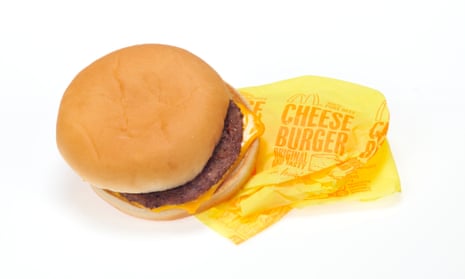McDonald’s has announced a supersized price increase, putting up the price of a cheeseburger by a fifth to £1.19 with immediate effect.
The chain blamed its first cheeseburger price hike in 14 years on soaring costs and said other big price increases were on the horizon.
The chief executive of McDonald’s UK and Ireland, Alistair Macrow, said it was committed to selling food at affordable prices but cost pressures meant it was having to “make some tough choices”.
He said: “This summer our restaurants will be adding between 10 and 20p to a number of menu items impacted most by inflation. From today we’ll be increasing the price of our cheeseburger for the first time in over 14 years, taking it from 99p to £1.19.
“We understand that any price increases are not good news, but we have delayed and minimised these changes for as long as we could.”
McDonald’s said some menu prices would be unaffected and that they would continue to vary across its 1,300 UK restaurants, because the majority are run by franchisees.
Other items on the menu that are expected to increase in price include breakfast meals, large coffees, McNugget share boxes and the popular McFlurry desserts. The cost of the “go large” option – sizing up from a medium drink and fries on a meal deal – is also doubling to 60p.
Companies are facing increased costs for things like fuel, wages and ingredients. Earlier this week Unilever, the owner of brands including Marmite, Ben & Jerry’s and Magnum ice-cream, said it had raised its prices by 11.2% in recent months and expected further increases throughout the year. Amazon has also said the cost of its Prime subscription service will rise by £1 a month from September.
Official figures show inflation running at a 40-year high of 9.4%. The rising cost of food is one of the major forces driving up living costs, with sharp increases in prices of staples such as milk, butter and eggs propelling food price inflation to 9.8%.
The price increases on the menu at McDonald’s are just the latest from big high street names. The rival chains Nando’s and KFC have already increased their prices as the supply chain disruption caused by the war in Ukraine pushes up the cost of poultry.
Even a morning coffee comes at a higher price these days. In February Pret a Manger raised the price of its subscription service as well as for some of its drinks after increases in the costs of milk, coffee beans and staff pay.
The rising cost of food in supermarkets and in restaurants is adding to the pressure on households who are also struggling to absorb spiralling fuel and energy bills. A fifth of UK households now have an average shortfall of £60 a week between what they earn and what they need to cover essentials such as energy bills, rent, transport and food, according to the latest data from the Asda Income Tracker collated by the Centre for Business and Economic Research.
Product price rises
Lurpak: Lurpak spreadable butter is so costly these days some stores put security tags on it. The price yo-yos due to special offers but the big four supermarket chains are currently selling 500g tubs for between £4 and £5 compared with £3 a year ago. Across all brands, the average for a 500g tub of spreadable butter is now just under £4 in the shops, roughly 70p more than in 2021, according to the Office for National Statistics (ONS).
Pret filter coffee: Pret’s filter coffee used to be 99p, but in May 2021 it rose to £1.25 and in February of this year the price was hiked again to £1.40 a cup. The 41% rise in less than a year is due to a mix of factors, from ingredients to staffing and energy bills.
Milk: the average price for a pint of milk is now 55p, 13p more than a year ago, according to ONS data. A dairy farmer’s main costs are feed, fuel and fertiliser and all have been subject to big hikes due to the hiatus caused by the Ukraine war.
Walkers crisps: A six-pack of Walkers ready-salted costs £1.75 in Tesco, 25p more than last summer. The sharp rise follows a difficult year for the company which had to contend with crisp shortages caused by IT problems as well as the soaring cost of vegetable oil.
Colin the Caterpillar: the popular chocolate-coated critter cake from Marks & Spencer now costs £8, £1 more than in 2021. Ingredients including chocolate, butter and eggs have all increased in price.
